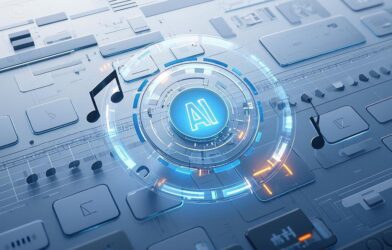The Rapid Evolution of Artificial Intelligence: A Global Overview
Artificial Intelligence (AI) is advancing at a rapid pace, transforming industries across the world and paving the way for innovations that were once unimaginable. From breakthroughs in AI hardware to global leadership shifts and new applications in education and climate science, AI is continuing to disrupt industries. Here’s a closer look at the latest developments that are driving AI forward and reshaping various sectors.
1. Nvidia’s AI Supremacy: Dominating the Hardware Market
Nvidia continues to assert its dominance as the leader in AI hardware, particularly with the launch of its Blackwell AI chip. This chip has been hailed as a significant step forward in AI computing, powering the future of data centers and generative technologies. Despite early concerns about potential cooling problems, Nvidia’s Blackwell chip has entered mass production, further solidifying its position as the go-to provider of AI processing units. The high demand for AI in industries ranging from cloud computing to machine learning has driven Nvidia’s stunning 94% quarterly revenue growth.
Nvidia’s stronghold in the AI hardware market is critical in the ongoing development of AI technologies, from data centers that support machine learning algorithms to generative AI applications like text, image, and video creation. As AI adoption continues to grow, Nvidia’s hardware innovations will play a central role in accelerating AI’s capabilities.
The company’s success highlights the increasing importance of specialized hardware in pushing AI to new frontiers, allowing companies to process large datasets faster and more efficiently. Nvidia is poised to remain a key player in the AI space, influencing everything from research and development to enterprise AI solutions.
Reference:
Nvidia AI Hardware Innovations
Nvidia’s AI Revenue Growth
2. Global AI Leadership Rankings: Shifting Dynamics of Innovation
The global AI race is becoming more intense, with several countries making significant strides in their AI capabilities. The United States remains the global leader in AI innovation, largely due to massive private investment and its focus on ethical AI research. Silicon Valley continues to be a hub of AI development, attracting tech giants, startups, and venture capital funding. Additionally, the U.S. leads in AI research and has set the standard for AI ethics, creating frameworks to ensure that AI technologies are developed responsibly and transparently.
However, China is making significant progress, particularly in generative AI. The country has surpassed other nations in filing generative AI patents, reflecting its growing influence in AI innovation. Chinese tech companies, supported by government backing, are leading the charge in AI deployment across industries such as e-commerce, finance, and healthcare.
Meanwhile, the UK is gaining recognition for its work in AI safety. With initiatives like the Global AI Safety Summit, the UK is positioning itself as a leader in ensuring that AI technologies are used ethically and safely on a global scale. Countries like India and the UAE are also climbing the ranks, with strategic investments aimed at developing AI-driven economies.
This shifting landscape demonstrates that AI innovation is not confined to just one or two countries. Rather, the global AI ecosystem is becoming more diverse, with each nation contributing to the AI revolution in different ways.
Reference:
AI Global Leadership
China’s Generative AI Patents
3. AI in Education: Opening Doors to New Learning Opportunities
The integration of AI into education is another area experiencing significant growth. OpenAI, the organization behind the popular AI language models, has partnered with Common Sense Media to offer free AI courses to K-12 teachers. This initiative is aimed at helping educators incorporate AI into their classrooms, both in terms of training teachers and engaging students in AI-related subjects.
By providing these educational resources, OpenAI is fostering the next generation of AI-savvy students and creating a new wave of teachers who are well-equipped to navigate the rapidly evolving landscape of technology. These efforts will undoubtedly have a profound impact on how students learn about AI, equipping them with the skills necessary to succeed in an AI-driven world.
This partnership signals a broader shift towards AI’s integration in education. It not only helps train teachers but also sparks students’ curiosity about AI technology. As AI continues to evolve, it will be essential to embed AI literacy into educational curriculums to prepare students for the challenges and opportunities of the future.
Reference:
OpenAI Education Initiative
AI in K-12 Education
4. DeepSeek-R1 Arrives: A Rival to OpenAI’s Models
AI research continues to make waves in the tech community, with DeepSeek, a Chinese AI research firm, unveiling its newest reasoning AI model, DeepSeek-R1. This new AI model is poised to compete with models developed by OpenAI and represents a significant leap in the field of AI reasoning.
Reasoning AI models are designed to understand and simulate logical reasoning, enabling machines to make decisions and inferences in complex situations. DeepSeek-R1 is expected to push the boundaries of AI by improving the problem-solving capabilities of machines, making them more adaptable to a wide range of tasks. This breakthrough could be pivotal in areas like natural language understanding, autonomous decision-making, and data analysis.
The introduction of DeepSeek-R1 underscores the growing competition between AI research firms worldwide. As AI reasoning technologies improve, we may see even more sophisticated AI models that can better understand and predict human behavior, automate decision-making processes, and enhance personalized experiences in various industries.
Reference:
DeepSeek’s AI Breakthrough
AI Reasoning Models
5. AI and Climate Science: Addressing Global Challenges
AI’s potential extends beyond business and consumer applications. Nvidia’s Earth-2 platform is leveraging AI to accelerate climate modeling and address some of the world’s most pressing environmental challenges. By utilizing AI microservices, Earth-2 is able to model complex climate scenarios and predict the effects of climate change more accurately.
This platform represents a powerful tool for climate scientists and policymakers, providing them with the data needed to make informed decisions about climate change mitigation. With AI, researchers can simulate various environmental scenarios and assess the potential impact of different actions, from reducing carbon emissions to shifting to sustainable energy sources.
AI in climate science has the potential to revolutionize how we understand and respond to environmental challenges. As AI technology continues to evolve, it will likely become an indispensable tool in combating climate change, offering new solutions for everything from renewable energy optimization to disaster response planning.
Reference:
Nvidia Earth-2 Climate Platform
AI and Climate Change
Conclusion: AI’s Rapid Evolution Across Industries
These innovations represent just a few of the groundbreaking advancements in AI that are shaping the world today. From AI hardware breakthroughs like Nvidia’s Blackwell chip to global leadership rankings and the integration of AI in education and climate science, AI is making significant strides in many sectors. As the technology continues to evolve, we can expect AI to revolutionize industries in even more profound ways, driving innovation, improving efficiency, and addressing global challenges.
The future of AI is incredibly bright, with advancements that promise to bring about lasting changes in everything from education to environmental science. As AI continues to develop, its potential for creating positive change seems limitless. For more updates on AI and its impact across industries, be sure to follow publications like Techopedia, OpenTools, and FutureTools.
Reference:
AI Global Advancements
AI and Environmental Science













